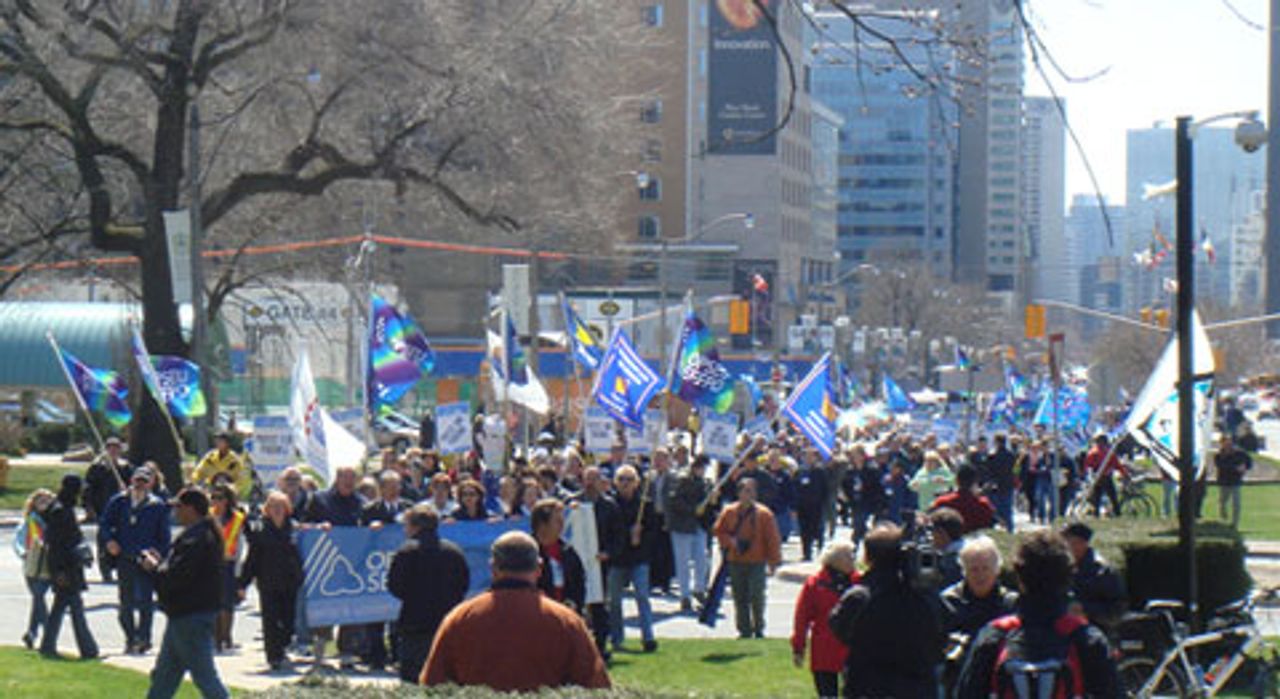 Thousands of CAW members, workers and pensioners, joined the rally at Queens Park, site of the Ontario Legislature
Thousands of CAW members, workers and pensioners, joined the rally at Queens Park, site of the Ontario LegislatureMore than eight thousand workers, pensioners, and unemployed from across southern Ontario rallied at the provincial legislature in Toronto Thursday afternoon. The action was called by a coalition of labour and seniors’ organizations to pressure the Ontario and federal governments to protect pensions endangered by the economic crisis.
The coalition was formed several weeks ago after Ontario Liberal Premier Dalton McGuinty announced, in the wake of threatened bankruptcies at Chrysler and General Motors, that the government is reneging on the obligations of the province’s three-decades-old Pension Benefit Guarantee Fund. The PBGF is supposed to make good short-falls in private pension benefits of up to $1,000 per retiree per month. But the fund, which has been repeatedly drawn on in recent years, only has a paltry $100 million in its reserve and the government is refusing to provide it any additional money, thus terminating the pension-guarantee at the very moment when it is needed.
 A section of the demonstration, marching up University Avenue
A section of the demonstration, marching up University AvenueThursday’s rally was the last in a series. It was preceded by smaller events held in front of the constituency offices of various Liberal cabinet ministers across the province.
Attempting to pit workers with pension plans against those with no coverage (about 65 percent of the population), McGuinty stepped up his intransigence this past Wednesday stating, “It’s certainly not our intention to put more money into the Fund. ...We need to be fair to all Ontario seniors and if we look to those without pensions to restore vitality to pensioners who benefit from those pensions, I don’t think that’s fair.”
It has been estimated that the Fund requires some $6 billion to prevent the impoverishment of those retired workers who were employed by companies currently facing bankruptcy. That list continues to grow across the province. Already pension plans are vulnerable at the telecommunications giant Nortel, at AbitibiBowater, Stelco (US Steel), DuPont Invista, Air Canada, and dozens of smaller companies.
And now with the threatened bankruptcies of Chrysler and General Motors, the potential exists for tens of thousands of retired autoworkers to lose some, or in the case of liquidation, all of the benefits that they worked a lifetime to accrue.
Under Canadian law the workers and retirees of companies that file for bankruptcy are treated as “unsecured” or lesser creditors by the courts, meaning their claims are only addressed after those of the banks and other secured creditors are satisfied. The potential therefore is that little or nothing will be left for pensioners. At the very least, bankruptcy would be used to impose steep pension cuts on the auto company retirees. The PBGF would be short some $2 billion with just the bankruptcy of GM.
More than one third of the attendees at the Toronto rally were auto workers and retirees bussed in from as far away as Windsor, St. Thomas, and Oshawa. There also was a large contingent of steelworkers from Hamilton and government workers, many on their lunch breaks, from the immediate vicinity.
They were addressed from the podium by an assemblage of trade union bureaucrats and New Democratic Party politicians (NDP). They outdid one another in denouncing McGuinty’s stance, but could offer nothing more in the way of action than applying continued pressure on the Liberals to change their minds. The bluster was only meant to placate the palpable anger of the workers in attendance. Even longtime McGuinty supporter Buzz Hargrove, past president of the Canadian Auto Workers union, told reporters during the rally that he held little hope that the government would reverse course.
Adding to the cynical prevarications from the podium were the speeches of new Ontario NDP leader Andrea Horwath and CUPE president and perennial NDP candidate Sid Ryan who bragged of their party’s solidarity with the movement for pensioners’ rights. Neither one, however, felt it politic to mention that it was the NDP government of former Ontario premier Bob Rae who played a central role in the present pension crisis at GM. In 1992, the Ontario NDP government amended the Pension Benefits Act so as to allow GM and several other major companies to fund their pension plans to a lower standard. Even in years when GM was making massive profits, it under-funded its pension plan. Analysts estimate that GM needs at least $5 billion in additional monies to bring its plan back into solvency.
CAW President Ken Lewenza said the Ontario Liberals and federal Conservatives would be punished at the “ballot box” if they didn’t protect pensioners. Referring to the demands of the Detroit Three automakers—demands that have been wholly supported by the federal Conservative and Ontario Liberal governments—for cuts in worker “legacy” costs, Lewenza declared, “They call you a legacy cost after your contribution to our country. You’re human beings that have bills, that need pension protection and pension income.”
In the hours before Thursday’s rally, Lewenza along with other CAW leaders had been hammering out details of a new contract with Chrysler to replace the three-year, concessions-filled deal the union made with the automaker in the spring of 2008. According to the Globe and Mail, the CAW has already signed off on the lion’s share of the $19 per hour per worker labor-cost cut demanded by Chrysler, leaving a difference of only a couple of dollars. Lewenza, who only last week was vowing that the CAW would never agree to concessions above and beyond the estimated $7 per hour savings granted GM last month, said yesterday, “There is no pattern any more.”
A WSWS reporting team interviewed workers and pensioners at the rally and distributed a leaflet entitled “Auto Workers Need a Socialist Strategy.” The statement urged auto workers to reject the false choice presented them by the automakers, the politicians, and the CAW between accepting massive jobs cuts and concessions through “negotiations” or having them imposed by the bankruptcy courts. (See: Defend pensions, jobs, and wages! No concessions! Auto workers need a socialist strategy).
The WSWS team found a palpable sense of outrage and disbelief from the assembled throng. “How can they do this to us,” said Nancy Lee, a retired government worker. “I think my pension is safe. Well, it better be. I guess auto workers thought they were safe a year or two ago. Now all bets are off. I can’t believe this is happening in a country like Canada. People work all their lives, pay into the system. And now they don’t know if they’ll be out in the cold. I can’t believe it.”
As at any demonstration there were telling vignettes. An inebriated auto worker was yelling “Drive a Canadian car, ass****”, at drivers passing by who were behind the wheel of Toyotas and Hondas. A steelworker stopped to ask, “What’s a Canadian car?”
Three forty-something auto workers from Windsor were chanting “Nationalize, Nationalize, Nationalize,” during Lewenza’s speech.
A very elderly pensioner in a wheelchair and festooned with old UAW and CAW pins, patches and ribbons was remembering to his care-giver the big strike in Windsor in 1945 that solidified the union in the Canadian plants. “It started in the body shop. Those guys ate nails for breakfast. The whole town circled the plant with our cars. Just like the boys in Flint.”
There were several different layers from the working class who spoke with the team. Jason, who has worked at Chrysler for ten years has two months to go before he is laid off. He was initially hesitant to talk to the WSWS but was eventually persuaded to share his views on his employers: “The amount of product we’ve turned out for them in the last twenty years and this is the thanks we get! Who’s going to give me back all my body parts that I’ve wrecked for them? ... My dad retired so I could get a job. And now he’s got to worry about this (crap)?” Jason was adamantly opposed to any further concessions: “I would work free for a year if it would help keep my job, but it won’t.” However, he disagreed strongly with the WSWS’s view that the CAW’s decision to split from the North American union was a mistake. “Guys were making good money for twenty years thanks to the union.”
When the WSWS team suggested that the split had proved to be a mistake from a historical perspective, Jason became adamant. “You’ve got to deal with now. A historical perspective won’t help you with what’s going on now.”
Tony, a CAW member from London, Ontario with thirty years in the auto industry said,
“I used to work in Oshawa, but actually I’m a London employee—there’s a whole busload of us up. A lot of the stuff that’s gone on, it’s kind of been orchestrated. This whole recession is not like the recession of ’83. This is a man-made situation. It’s all about globalization. There’s agendas at work that we have no comprehension about, but I’ll tell you, in the end, it’s the people that have the power. They just don’t know it. That’s what the union should have been telling them from day one. They are the ones that have the power, and anything that they don’t have it’s because they forfeit it to the company.”
 Brian, a member of the CAW, travelled from
Brian, a member of the CAW, travelled from southern Ontario to the demonstration at
Queens Park
Brian, a projects coordinator and a member of the CAW had a lot to say about Obama, globalization and the economic crisis.
“It’s a lot different now. I look at who is in Obama’s cabinet, who he picked to stand beside him—its money, money, money. It’s all financial. And it goes beyond Obama, he’s the president. But he’s not the one pulling the strings. There’s a whole elite behind him just watching. They got their money, they got their happiness and they watch everything else crumble around. ... It’s a global economy now, one global country. You talk about long term, you wonder what’s sustainable. I think the whole system isn’t sustainable. Like our financial system—what was it built on? It wasn’t built on a pile of gold, it was built on a pile of paper and we’re finding out what that pile of paper’s worth now—the paper. It’s all interconnected. You’re not going to change the whole system but at least this is raising awareness. ... I’d love to see a socialist alternative.”
